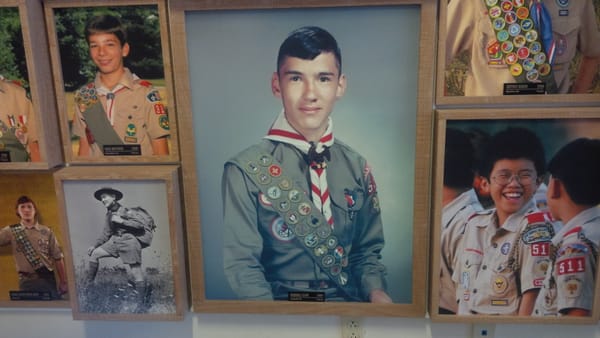Where LGBTQ inclusion continues to fall short
Jay Denoncourt, a trans Eagle Scout, says she has been almost completely shut out of Scouting for who she is. Her story shows how "inclusive" policies alone are not enough.

Jay Denoncourt was the type of scout who memorized the Scout Oath and Law by the second troop meeting, eager to earn the Scout badge and jump headfirst into the program.
“Scouting is one of those things that I immediately fell in love with,” she said.
Denoncourt had joined a troop out of a Catholic church in Louisville, Kentucky. The year was 2009, which Denoncourt says was the perfect time to join Scouting: Just on the eve of its centennial anniversary and the bonanza of special events and programs that came with it.
It didn’t take long, however, for Denoncourt’s Scouting experience to begin to sour. There was an incident in the troop with a scoutmaster who Denoncourt reported for violations of youth protection policies, she said.
By 2013, Denoncourt switched troops and tried to carry on. The new troop was a breath of fresh air: A smaller environment where Denoncourt felt like she could really contribute.
A year later, she earned her Eagle Scout rank, setting off a prolific period for Denoncourt: She founded a Venturing crew (a co-ed Scouting program for folks aged 14-20); joined the Order of the Arrow (Scouting’s national honor society); staffed summer camps and training programs; and went to her first national Scouting event, all within the span of a year or two.
But a busy Scouting schedule wasn’t the only major force in her life at the time.
“I was starting to realize that I was bisexual,” she said.
That was during the same year the Boy Scouts had ended their ban on gay members, so Denoncourt decided to come out.
“As soon as I came out, all of that stopped. All of the job offers, or staffing position offers, stopped,” she said.
Around this time, she had also left the Catholic Church for the Baha'i faith. And in 2016, she came out as trans, which she said further ostracized her from the local Scouting community.
“To be a non-Christian, LGBT scout in the southern region is not fun,” she said.
At this point Denoncourt was ready to leave Scouting — she was aging out and wanted to focus on college, anyway. But there was something that inspired her to stay: The opportunity to help bring Sea Scouting back to her local council. (Sea Scouts is the BSA’s program that focuses on water safety, boating skills and maritime heritage.)
She worked tirelessly for three years to help leaders and youth in the council understand the program, giving them the tools to bring two Sea Scout ships to life in 2020. But she wasn’t able to join either. Why? The ships are chartered by organizations that reject LGBTQ adult volunteers.
“That was the final nail in the coffin. I did all this work, they're not even going to let me volunteer with the program,” she said.
Denoncourt’s exclusion underlines a fact that is often forgotten in the narrative of LGBTQ membership in the Boy Scouts: The 2015 policy decision to end blanket exclusion of LGBTQ adults did not guarantee their inclusion. It carved out a path for any chartering organization (all Scouting units are “chartered” by independent schools, churches or other civic groups) to reject LGBTQ leaders if it went against their values.
This nuance in the policy was seen largely as a way to appease religious chartering groups who might have balked at mandated inclusion. As I wrote back in 2015: “In essence, inclusion is now allowed by national policy, but the BSA is still willing to defend churches that exclude gay leaders from the troops they sponsor.”
And so it was with Denoncourt, leaving her on the outside of a program she had dedicated much of her young adult life to improving.
She does, however, retain one connection to Scouting: A job working in her local Scout Shop. Because the shop is run by the national organization, and not her local council, she said she’s allowed to work there as an openly trans woman. She wears makeup and the women’s Scouting uniform during her shifts. (Note: As an employee of the Boy Scouts of America, Denoncourt’s personal opinions do not necessarily reflect those of the BSA.)
While Denoncourt has been happy to leave behind what she called “the homophobes and the transphobes” of the local Scouting program — at one point, she was getting regular death threats — she still yearns to rejoin Scouting one day. But she knows now is not the time.
“I want to support this program, but I know that I'm going to be turned away for the person I am,” she said.
Have a friend who might like this newsletter? You can share it with them, and I've already written the email for you — all you have to do is click here, and add your friend's email address. Thanks for sharing!


